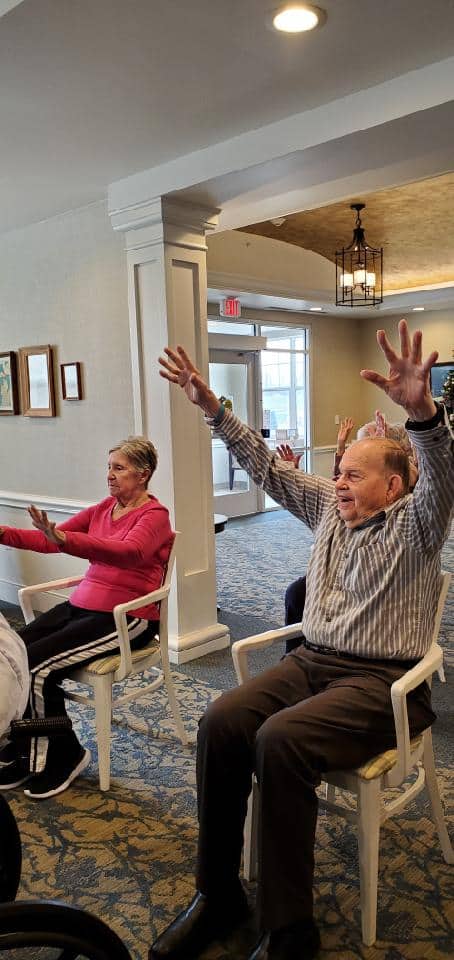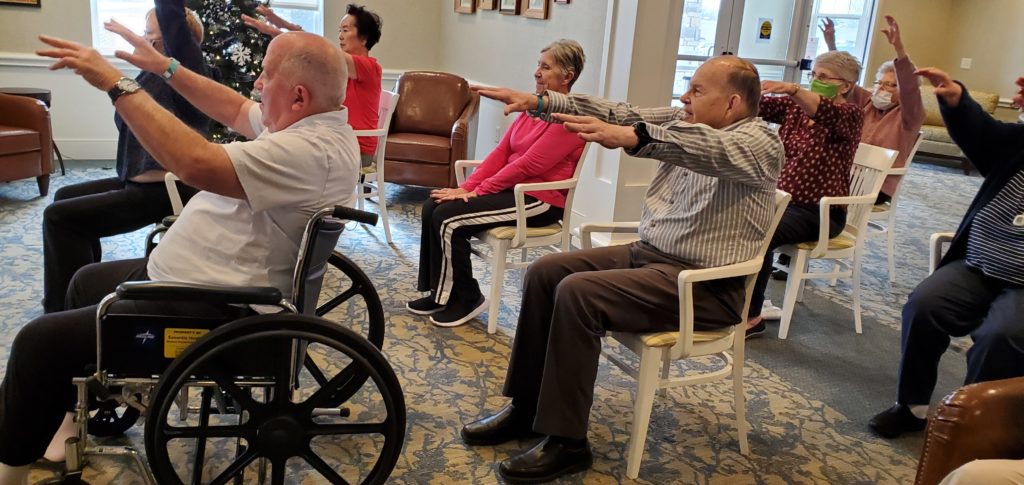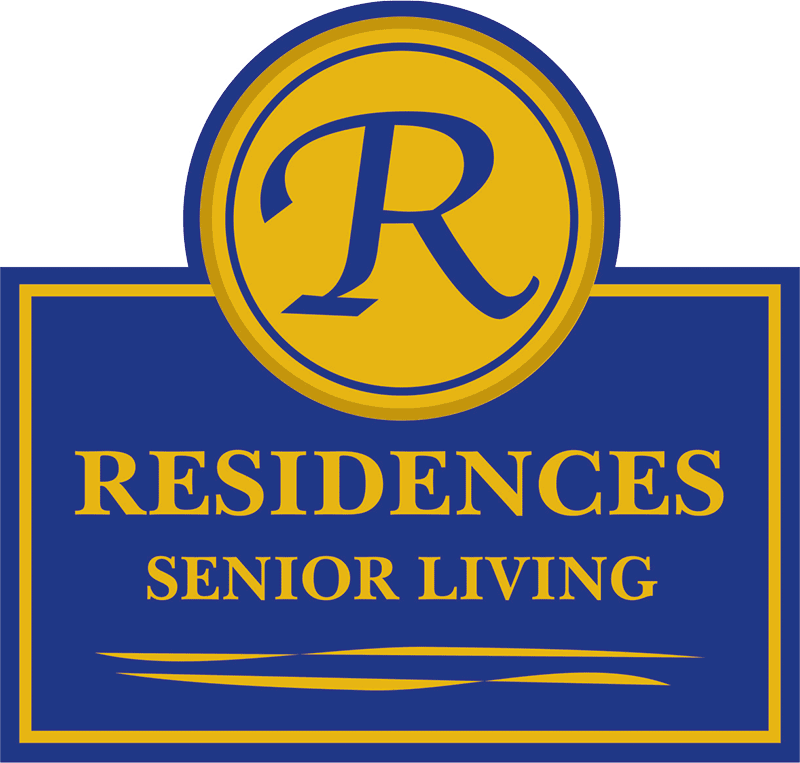Tai Chi, yes, the exercise with the slow and deliberate swooping movements you’ve seen people doing in movies and on tv, can be your good RX and experience for what ails you, if only you’d give it a try. Residences Senior Living is so convinced about the difference it makes for the seniors who live at Residences at Deer Creek in Schererville and Residences at Coffee Creek in Chesterton, that they’ve regularly scheduled an area “expert leader” to conduct frequent sessions as part of their Life Enrichment programs.

In their search for a good low-impact exercise that could even be performed seated, Emily Aguilar, Director of Life Enrichment at Residences at Deer Creek, and Angela Williams, Director at Residences at Coffee Creek, agree that Tai-Chi with Hannah not only benefits the overall well-being of residents, but entices them to stay with it week after week.
“When it’s time for Hannah and Tai-Chi, we have to be sure we’re in an area of our building where we accommodate many participants,” explains Angela. “Chairs are placed, and we make room for those who use wheelchairs, too.” Emily shares that enthusiasm about the numbers of participants and emphasizes that it’s the interest, the “feeling better”, and the encouragement of Hannah that sparks the enthusiasm of the residents who look forward to Tai-Chi with Hannah. “She makes it fun, almost effortless, but the effects are evident. Residents keep coming back for more,” agrees Angela and Emily.
Exercise and movement are of great importance for everyone’s health, and especially for seniors who are so keenly aware of the adage “use it or lose it” in terms of muscle tone and mobility. “One and done” is another popular description that’s not particularly positive when applied to trying an exercise program. “It’s the regular participation that makes the difference with exercise and movement. We have a responsibility on behalf of our residents, observing their likes and dislikes, listening to their suggestions and therefore, responding to their needs. There’s no benefit to providing a program just to say you have one. Exercise may be necessary but not always welcomed; Tai-Chi with Hannah—that’s a hit out of the ballpark,” they laugh.
Hannah Coetzee says she is inspired by her grandmother of 88 years who lives in Griffith. During the initial months of the Covid-19 Pandemic she noticed the isolation and its effects on seniors and re-doubled her efforts to keep seniors, who have always been her passion, moving. Hannah has been a personal trainer and she wanted to specialize in senior strength classes. She has always enjoyed and taught exercise classes, especially yoga, and taught for ten years at the YMCA. She has also taught cycling classes. She understands the importance of keeping people moving.
Hannah is a natural for teaching, with her experience as a third grade teacher in South Africa. While she now resides in Crown Point with her husband, two daughters and son, her husband’s father remains as a physician. The busy family is involved with sports and is always on the move. The family includes a dog, a cat, and a bearded dragon!
“Tai-chi is meditation in motion” explains Hannah. The belief is that Chi is energy and just like blood does throughout the body, energy circulates. When blocked, it leads to dis-ease, or illness. Energy has to flow.” The ancient Chinese practice of over 1,500 years teaches that the mind integrates with the body. The slow, relaxing deeper stretches actually opens joints. The energy flow helps strengthen, enables flexibility, and helps one to maintain their balance. Slowing the breathing reduces anxiety and emotional imbalance as well.
Indeed, much scientific study has delved into the abilities of Tai-Chi. One of the most interesting concepts is that Tai-Chi was explored in a 2017 study published in the Journal of Exercise Rehabilitation concerning falling as a result of fear. Basically, and simply put, improving balance through Tai-Chi reduces the fear of falling which in and of itself is a risk. The premise is that people who are afraid of falling avoid movement which leads to weakening and therefore, can actually increase the probability of falls. Improving mood and quality of living through exercise reduces the fear of falling and therefore enables the strengthening of the body. As Hannah is quick to point out, the mind and body are truly connected. She believes Tai-Chi is one of the very best ways to keep seniors engaged and moving. Tai –Chi is slow and gentle, and fun.
Tai-Chi studies have pointed to its effectiveness in reducing pain, especially for knee osteoarthritis, back problems, and fibromyalgia. Many residents say their back pain is relieved through the stretches and deep breathing with Tai-Chi. Think about it—improving pain improves the mood. The reverse is also true, improve the mood, reduce the pain. Tai-Chi has positive effects on prevention of heart disease, high blood pressure, diabetes, and other chronic conditions.

What moves Hannah the most about her sessions with our residents is”… seeing people come out of their shells, looking forward to coming to Tai-Chi…” and observing the physical changes—the increased flexibility. “Memory Care participants are among the most rewarding; seeing people who haven’t moved much for years start to at least move their hands. That’s when I know we’ve made a connection.” For Dorothy, an Assisted Living resident at Coffee Creek, Tai-Chi with Hannah makes her feel better, gives her something to look forward to; for Hannah, “It’s like having a lot of ‘Grands’!”
For more information about Life Enrichment programs at Residences Senior Living, visit us online at www.ResidencesSeniorLiving.com, Facebook, or call Residences at Deer Creek in Schererville (219) 864-0700 or Residences at Coffee Creek, Chesterton, (219) 921-5200.
